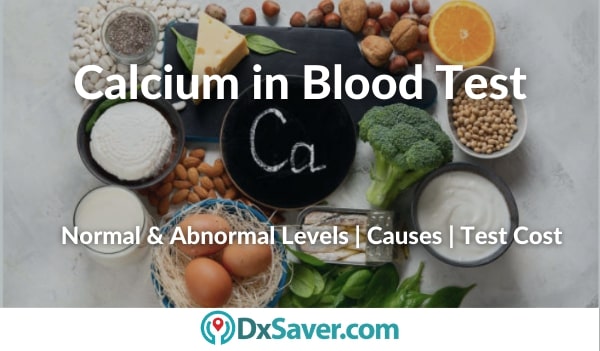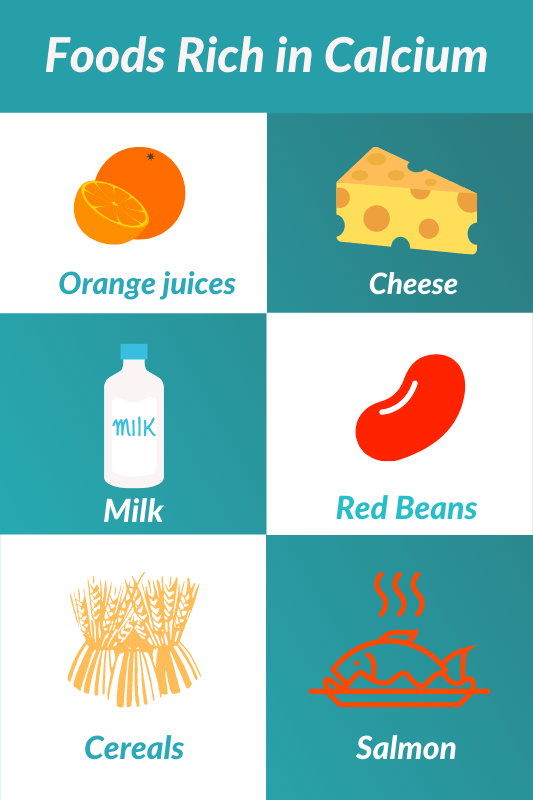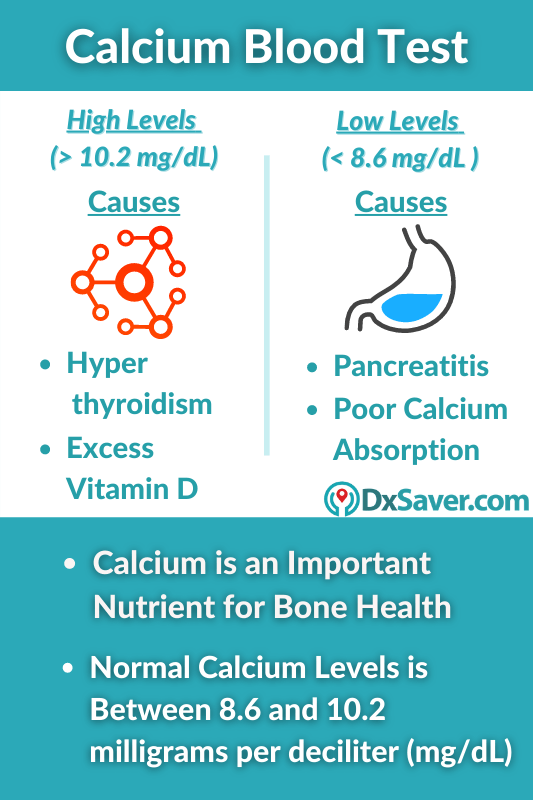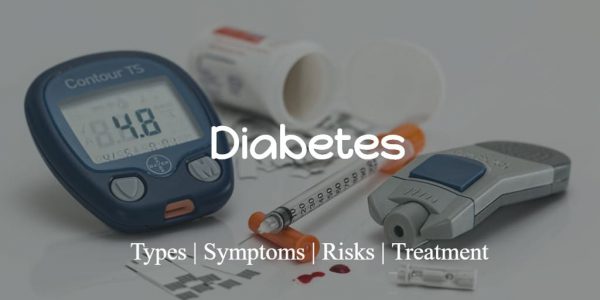
Calcium is an important nutrient that helps in the nourishment of teeth and bones. Lack of calcium can lead to serious health issues, like fragile bones that easily fracture. Women need good calcium amount than men because Osteoporosis is highly common in elderly women. Calcium is also vital for children’s growth. Children who fall behind in calcium content could develop health issues, and may not grow to their full potential height.
Thus, a calcium blood test is done as a routine health screening to find out whether you have too much or too little of this key mineral in your bloodstream. This test also is done as a diagnostic measure for diseases that affect the heart, nerves, kidneys, and other organs.
- Calcium Blood Test Cost
- What is Calcium & Why is it Important?
- What is a Calcium Blood Test?
- How is the Calcium Blood test performed?
- Is there any Preparation Required before the Test?
- Are there any risks in the Calcium blood test?
- What does the Calcium Blood Test Result Mean?
- Calcium blood test high
- Calcium blood test low
- How to improve low Calcium levels in blood?
- How to reduce high Calcium levels in blood?
- Providers Locations
For our readers, who are very much interested in knowing the Calcium Blood test cost beforehand, we would like to begin with that section.
Calcium Blood Test Cost
The cost of the Calcium blood test ranges between $29 and $47 in different labs and facilities across the U.S. No prior appointment is required. Compare the price, order your test online and visit the nearest lab during lab business hours. Complete the procedure and get the results in your email in 2 to 3 business days. Doctor consultation is also available for further treatment or for any kind of medical advice.
The following table shows the Calcium blood test cost at 2 of our partner laboratories (CLIA – Certified) network located across the U.S.
Name of our Partner Labs | Book Online |
HealthLabs
| Offer Price$29 |
Personal Testing Labs
| Offer Price$47 |
Calcium Urine Test Cost
The cost of the Calcium urine test is $29 in the U.S. No prior appointment is required. Compare the price, order your test online and visit the nearest lab during lab business hours. Complete the procedure and get the results in your email in 2 to 3 business days. Doctor consultation is also available for further treatment or for any kind of medical advice.
The following table shows the Calcium urine test cost at one of our partner laboratories (CLIA – Certified) network located across the U.S.
Name of our Partner Labs | Book Online |
HealthLabs
| Offer Price$29 |
Cost of Calcium blood/urine test cost with insurance
Many health insurance policies in the U.S. cover the cost of the calcium blood/urine test when it is done once or twice a year. If your physician recommends you to take the calcium blood/urine test more than twice in a year, you may have to pay the medical bill out of pocket. Also, the coverage offered by private health insurance policies and national health insurance programs varies widely. So we recommend you to check with your insurance company.
Our Calcium blood testing providers do not accept any health insurance. But, on request, they can provide you with a receipt containing all the details like the name and code of the test, and CPT code which is necessary for insurance reimbursement purposes.
What is Calcium & Why is it Important?
Your body needs calcium to function promptly without any health issues. Calcium is essential for keeping your teeth and bones healthy. Calcium also plays a vital role in maintaining muscle, nerve functions, and carrying messages from your brain to other parts of the body.
Without calcium, your bones and tooth will weaken. You can imagine a reservoir or storage of calcium content as your bones in your body. When your calcium intake levels deplete, your bones will become fragile, as your body will start taking calcium from your bones. Thus calcium level is needed to be present in the body in the apt amount according to the age group.
As per the NIH (National Institutes of Health), the following are the normal levels of calcium intake that needs to be taken in your diet for healthy bones and other organs –
Daily normal Calcium intake levels in Men:
| Age Group | Daily recommended calcium dietary allowance (RDA) |
| Men – 71 years and up | 1,200 mg |
| Men – 51-70 years | 1,000 mg |
| Men – 31-50 years | 1,000 mg |
| Men – 19-30 years | 1,000 mg |
Daily normal Calcium intake levels in Women:
| Age Group | Daily recommended calcium dietary allowance (RDA) |
| Women – 71 years and up | 1,200 mg |
| Women – 51-70 years | 1,200 mg |
| Women – 31-50 years | 1,000 mg |
| Women – 19-30 years | 1,000 mg |
Daily normal Calcium intake levels in children:
| Age group | Daily recommended calcium dietary allowance (RDA) |
| Children – 9-18 years | 1,300 mg |
| Children – 4-8 years | 1,000 mg |
| Children – 1-3 years | 700 mg |
| Children – 7-12 months | 260 mg |
| Children – 0-6 months | 200 mg |
What is a Calcium Blood Test?
Calcium levels in your blood are maintained by your parathyroid hormone (PTH), your kidneys, and intestines. When your body requires calcium, the parathyroid gland inject a hormone into the bloodstream, this hormone signals
When the body needs calcium, the parathyroid glands secrete a hormone. This hormone signals that:
- the kidneys to excrete less calcium into the urine
- the bones to release calcium into the blood
- the kidneys need to activate vitamin D (vitamin D helps the digestive tract to absorb more calcium)
As the maintenance of calcium, pumping is controlled by the parathyroid gland, overactive or underlying health conditions can lead to severe health complications as too much calcium or too little calcium is disastrous. Thus, a calcium blood test is performed to evaluate your calcium levels and to find the causes of any abnormal levels. Your physician may also order this test if you have kidney disease, parathyroid disease, cancer, or malnutrition.

How is the Calcium blood test performed?
As the name suggests, the Calcium Blood test is a simple blood test. During this test, a lab technician or a phlebotomist will cleanse the skin with an antiseptic and place an elastic band around the upper arm so that the vein becomes visible and swells with blood. He/she then injects a needle and draws a sample of blood in a test tube. After the blood is drawn, he covers the injected area with a band-aid to stop bleeding. The typical blood specimen is then sent to the lab for analysis.
It takes less than 10 minutes to perform this test.
Is there any preparation required before the test?
There is no special preparation required for the Calcium Blood test, however, you will be asked to avoid taking the following supplements few days before the test, as they may influence the calcium levels in your blood test –
- Antacids
- Diuretics for high blood pressure
- Lithium for bipolar disorder
- Vitamin D supplements
But if the blood sample is going to be used for other tests, you may have to fast for a certain period. Your concerned physician will give you specific instructions on diet.
Are there any risks in the Calcium Blood test?
There is no possible risk or complication in taking the Calcium blood test. You might have slight pain or bruise in the injected area for a very little period.
What does Calcium Blood Test Result Mean?
Your calcium levels in the blood test are measured in milligrams per deciliter (mg/dL). A healthy individual’s calcium blood test should reflect total calcium in blood between 8.6 and 10.2 milligrams per deciliter (mg/dL). Sometimes, you do not experience any abnormal symptoms despite having high/low calcium levels in your blood. Your physician will order for calcium levels if you have the following health conditions as they may influence your calcium levels –
- Kidney disease
- Thyroid disease
- Malnutrition
- Certain types of cancer
Calcium Blood Test High
If your calcium blood test results show more than 10.2 milligrams per deciliter (mg/dL) then your calcium levels are higher than normal levels.
Causes of High Calcium in the Blood
High calcium levels in your blood (otherwise knows as hypercalcemia) test could be a cause of one of the following factors –
- Primary hyperparathyroidism (an overactive set of parathyroid glands) or certain types of cancer
- Hyperthyroidism (an overactive thyroid gland)
- Kidney or adrenal gland failure
- Paget’s disease of the bone, a condition that causes your bones to become too big, weak, and prone to fractures
- Sarcoidosis, an inflammatory disease that causes growths called granulomas to develop throughout your body
- Being bedridden or immobilized for a prolonged period of time
- Medications such as lithium and thiazide diuretics
- Excessive intake of calcium from vitamin D supplements or milk
- Overuse of antacids that contain calcium
- Certain types of cancer (together with hyperparathyroidism these account for 80 to 90 percent of hypercalcemia cases)
After identifying the cause of your elevated calcium levels, your doctor will recommend treatment according to your cause.
Symptoms of High Calcium in Blood
Calcium test result values that fall above 10.2 milligrams per deciliter (mg/dL) are considered high. High blood calcium level is called hypercalcemia.
Symptoms of high calcium levels are:
- Tiredness or weakness
- Nausea or vomiting
- Low appetite
- Abdominal pains
- Having to urinate more frequently
- Constipation
- Excessive thirst
- Bone pain
Calcium Blood Test Low
If your calcium blood test results show less than 8.6 milligrams per deciliter (mg/dL) then your calcium levels are lower than normal levels, it may indicate:
Causes of Low Calcium in Blood
Low calcium levels in your blood (otherwise knows as hypocalcemia) test could be a cause of one of the following factors –
- Hypoparathyroidism (an underactive parathyroid gland)
- Kidney failure
- Pancreatitis (inflammation of the pancreas)
- Problems with the absorption of calcium
- Certain medications, including corticosteroids, anticonvulsants, and rifampin (an antibiotic)
- Deficiency of calcium or vitamin D in your diet
- Low levels of albumin in the blood, possibly due to malnutrition or liver disease, in which the total calcium level may or may not reflect a truly hypocalcemic state
After identifying the cause of your low calcium levels, your doctor will recommend treatment according to your cause.
Symptoms of Low Calcium in Blood
Calcium test result values that fall below 8.6 milligrams per deciliter (mg/dL) are considered low. Low blood calcium level is called hypocalcemia. Generally, calcium deficiency occurs when either too much calcium is lost through your urine or when your bones do not release enough calcium into your blood.
Symptoms of low calcium levels include
- Tingling in the lips, tongue, fingers, and feet
- Muscle cramps (cramps in your abdomen or muscles)
- Muscle spasms
- Irregular heartbeat

How to improve low Calcium levels in blood?
Low calcium levels can be improvised by taking supplements and changing diet habits with Calcium and Vitamin D-rich foods. Your body doesn’t produce calcium naturally, so your calcium levels are dependant on your diet in general. If you do not take enough calcium, it can result in hypocalcemia where your bones will start thinning and you are at a long-term bone health complication called osteoporosis. This can make your bones fragile and highly fracture-risky.
Following are some of the ways to improve calcium levels in your blood –
- In the case of severely decreased levels, a calcium infusion could be ordered.
- Taking calcium pills/supplements.
- If you have mildly reduced blood calcium levels, increasing your dietary intake of calcium may be recommended (which we are discussing next).
Diet to improve low Calcium levels
Your body doesn’t produce calcium, so you have to rely on your diet to get the calcium you need. Foods that are high in calcium include:
- Increase your dietary intake of calcium, include the following foods to boost your calcium levels.
- Greens (collard and kale)
- Sardines and salmon (with bones)
- Red beans
- Seaweed
- Cereals
- Orange juices
- Dairy products are the richest in calcium:
- 8 oz. of milk or yogurt has – 300 mg of calcium
- 1 oz. of cheddar cheese has – 200 mg of calcium
- 4 oz. of Tofu has – 250 mg of calcium
Your body also needs Vitamin D to absorb the calcium that you intake. That is, you also require a good amount of Vitamin D rich-content in your diet to have an effective outcome of your calcium intake foods. Sunshine is one of the best sources of vitamin D, that you can get for free. Take 400-800 mg of Vitamin D with your calcium supplements per day; this way you ensure that the calcium you take is being absorbed effectively.
However, too much calcium intake may also be hurting your health. Make sure you take in enough calcium if your blood test results indicate hypocalcemia. The recommended intake of calcium daily, for bone health, is based on your age is mentioned above. Discuss with your healthcare provider if calcium replacement therapy is needed for you.
How to reduce high Calcium levels in blood?
If you have high calcium levels, it can have negative side effects on your health, like increasing your risk of kidney stones.
A mild increase or temporary increase in your calcium levels can be brought back to normal with goof diet restrictions and plenty of water intake. In the case of a moderate to a severe increase in your calcium levels, treatments include the following:
- Calcitonin is a hormone produced in the thyroid gland. It slows down bone loss.
- Intravenous fluids can help hydrate you and lower calcium levels in the blood.
- Corticosteroids are anti-inflammatory medications, they are useful in diagnosing too much vitamin D.
- Loop diuretic medications can help your kidneys move fluid and get rid of extra calcium, especially if you have heart failure.
- Intravenous bisphosphonates lower blood calcium levels by regulating bone calcium.
- Dialysis can be performed to remove the extra calcium and waste off your blood when you have damaged kidneys.
Primary hyperparathyroidism
If you have abnormal function of parathyroids, and depending on your severeness of the calcium levels, surgery might be recommended to remove the abnormal parathyroid glands. However, this is subjective to your age, kidney function, and bone effects.
If surgery isn’t an option for you, your doctor may recommend a medication called cinacalcet. This treatment helps lower your calcium level by decreasing parathyroid production. If you have osteoporosis, your physician might recommend bisphosphonates to reduce your risk of fractures.
Cancer
If your calcium levels are elevated due to cancer, your doctor will discuss treatment options with you to help you determine the best ways to treat hypercalcemia.
Diet to reduce high Calcium levels
Mild levels of hypercalcemia can be treated by :
- Drink more water
- Reduce your calcium-rich food intake like dietary products.
- Switch to a non-thiazide diuretic or blood pressure medicine
- Avoid calcium-rich antacid tablets
- Avoid taking calcium supplements
Providers Locations
The Calcium blood test can be done in any of the following locations across the U.S. by visiting the nearest lab. To know the Calcium blood test cost, refer to the first section of the article.
- Alabama
- Arizona
- Arkansas
- California
- Colorado
- Connecticut
- Delaware
- Florida
- Hawaii
- Georgia
- Idaho
- Illinois
- Indiana
- Iowa
- Kansas
- Kentucky
- Louisiana
- Maine
- Michigan
- Minnesota
- Mississippi
- Missouri
- Montana
- Nebraska
- Nevada
- New Hampshire
- New Mexico
- North Carolina
- North Dakota
- Oklahoma
- Oregon
- Pennsylvania
- Puerto Rico
- South Carolina
- South Dakota
- Tennessee
- Texas
- Utah
- Vermont
- Virginia
- Washington
- West Virginia
- Wisconsin
- Wyoming
Frequently Asked Questions
Will insurance cover my testing cost?
No, insurance will not be covered in the billing. However, they will provide you a receipt for insurance reimbursement purposes.
How should I book my appointment?
You can choose the most suitable provider from above and make an appointment by following the instructions mentioned by them.
Can I cancel my lab test order?
Yes, you can cancel your lab test order anytime before your testing. A refund will be initiated after deducting the cancellation fee. However, cancellation is at the discretion of the provider.
Do the providers offer result interpretations?
Yes, a few providers may provide doctor consultation who will take you through the results and provide clarification if needed.
How do I receive my report?
To ensure your privacy, the test report will be mailed to you by the provider.
Other topics you may be interested in:-
- Signs and Symptoms of Oral Syphilis
- H Pylori Test Cost in the US
- Symptoms of Gonorrhea Infection in Men
- Ferritin Test Cost in the US
- What is Lyme Disease?
- STD Testing Cost in Las Vegas, Nevada
- Allergy Testing Cost in the US
- What is Sickle Cell Disease?
- Amylase Test Cost in the US
- Is Itching a Symptom of STD?
- Types of STDs that cannot be cured
- Types of STDs That Cause Mouth Sores Symptoms in Men and Women
- Herpes Vs. HPV: Differences, Symptoms, and Testing Cost
- Importance of CA 125 Testing & Ovarian Cancer in Women
- C-Peptide Normal Levels, Test Results & Treatment
- Oral STDs: Names, Symptoms, Treatment and Testing Cost






